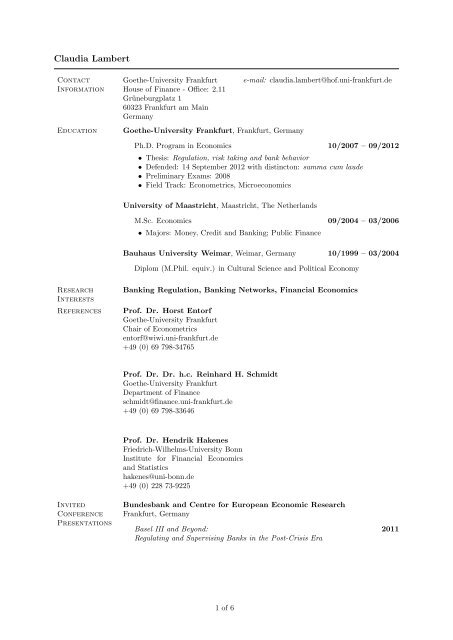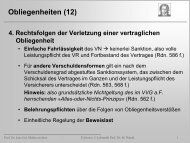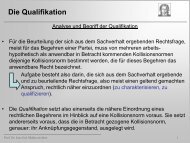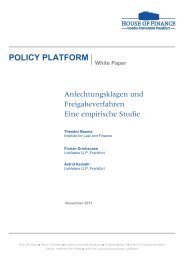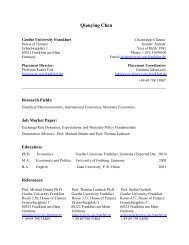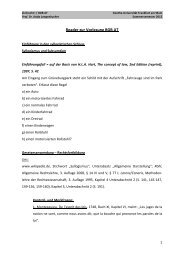Claudia Lambert - House of Finance
Claudia Lambert - House of Finance
Claudia Lambert - House of Finance
You also want an ePaper? Increase the reach of your titles
YUMPU automatically turns print PDFs into web optimized ePapers that Google loves.
<strong>Claudia</strong> <strong>Lambert</strong><br />
Contact<br />
Information<br />
Goethe-University Frankfurt<br />
<strong>House</strong> <strong>of</strong> <strong>Finance</strong> - Office: 2.11<br />
Grüneburgplatz 1<br />
60323 Frankfurt am Main<br />
Germany<br />
Education Goethe-University Frankfurt, Frankfurt, Germany<br />
Research<br />
Interests<br />
e-mail: claudia.lambert@h<strong>of</strong>.uni-frankfurt.de<br />
Ph.D. Program in Economics 10/2007 – 09/2012<br />
• Thesis: Regulation, risk taking and bank behavior<br />
• Defended: 14 September 2012 with distincton: summa cum laude<br />
• Preliminary Exams: 2008<br />
• Field Track: Econometrics, Microeconomics<br />
University <strong>of</strong> Maastricht, Maastricht, The Netherlands<br />
M.Sc. Economics 09/2004 – 03/2006<br />
• Majors: Money, Credit and Banking; Public <strong>Finance</strong><br />
Bauhaus University Weimar, Weimar, Germany 10/1999 – 03/2004<br />
Diplom (M.Phil. equiv.) in Cultural Science and Political Economy<br />
Banking Regulation, Banking Networks, Financial Economics<br />
References Pr<strong>of</strong>. Dr. Horst Entorf<br />
Goethe-University Frankfurt<br />
Chair <strong>of</strong> Econometrics<br />
entorf@wiwi.uni-frankfurt.de<br />
+49 (0) 69 798-34765<br />
Invited<br />
Conference<br />
Presentations<br />
Pr<strong>of</strong>. Dr. Dr. h.c. Reinhard H. Schmidt<br />
Goethe-University Frankfurt<br />
Department <strong>of</strong> <strong>Finance</strong><br />
schmidt@finance.uni-frankfurt.de<br />
+49 (0) 69 798-33646<br />
Pr<strong>of</strong>. Dr. Hendrik Hakenes<br />
Friedrich-Wilhelms-University Bonn<br />
Institute for Financial Economics<br />
and Statistics<br />
hakenes@uni-bonn.de<br />
+49 (0) 228 73-9225<br />
Bundesbank and Centre for European Economic Research<br />
Frankfurt, Germany<br />
Basel III and Beyond: 2011<br />
Regulating and Supervising Banks in the Post-Crisis Era<br />
1 <strong>of</strong> 6
Conference<br />
Presentations<br />
Grants and<br />
Honors<br />
European <strong>Finance</strong> Association (EFA) 2012<br />
Copenhagen, Denmark<br />
Verein für Socialpolitik (VfS) 2012<br />
Göttingen, Germany<br />
4 th International <strong>Finance</strong> and Banking Conference (IFABS) 2012<br />
Valencia, Spain<br />
Annual Meeting <strong>of</strong> the American Economic Association (AEA) 2012<br />
Chicago, IL, USA<br />
CEPR Winter Confernce on Financial Intermediation 2012<br />
Lenzerheide, Switzerland<br />
14 th Swiss Society for Financial Market Research 2011<br />
Zurich, Switzerland<br />
French <strong>Finance</strong> Association (AFFI) 2010<br />
Paris, France<br />
Southern <strong>Finance</strong> Association Annual Meeting 2010<br />
Asheville, NC, USA<br />
International Risk Management Conference 2010<br />
Florence, Italy<br />
INFINITI Conference 2010<br />
Dublin, Ireland<br />
ESCEM Conference on Regulation 2010<br />
Paris, France<br />
Best Paper Award at the Annual Conference <strong>of</strong> the<br />
Financial Engineering and Banking Society (FEBS) 2012<br />
ESCP Europe Business School, London<br />
Goethe-University Frankfurt, Travel Grant 2012<br />
AEA Annual Meeting<br />
Goethe-University Frankfurt, Travel Grant 2010<br />
French <strong>Finance</strong> Association<br />
German Academic Exchange Service, Travel Grant 2010<br />
Southern <strong>Finance</strong> Annual Meeting<br />
German Research Foundation, Scholarship 2007 - 2008<br />
Ph.D. Program<br />
German National Academic Foundation, Scholarship 2002 - 2004<br />
Graduate Studies<br />
German National Academic Foundation, Research Grant 2003<br />
Master thesis, Visiting Scholar<br />
German Academic Exchange Service, Internship Grant 2001<br />
CBS News Productions, New York City, NY, USA<br />
2 <strong>of</strong> 6
Teaching<br />
Experience:<br />
Academic and<br />
Non-Academic<br />
Pr<strong>of</strong>essional<br />
Service<br />
Goethe-University Frankfurt, Frankfurt, Germany<br />
Instructor 2012<br />
• Microeconometrics <strong>of</strong> Banking, Undergraduate level<br />
(lecture and tutorial, independently designed)<br />
Goethe Business School, Frankfurt, Germany<br />
Executive teaching, European Supervisory Education Initiative 2012<br />
• Risk Models in Banks<br />
The role <strong>of</strong> risk management: What do we now? An Academic View<br />
Bauhaus University Weimar, Weimar, Germany<br />
Teaching Assistant 2002<br />
• Merger and Acquisitions, Undergraduate level<br />
Pr<strong>of</strong>. Dr. Matthias Maier<br />
ITGAIN Consulting GmbH, Frankfurt, Germany<br />
Executive teaching 2012<br />
• Regulating <strong>of</strong> dynamic capital markets - current developments and future<br />
challenges<br />
ITGAIN Consulting GmbH, Hamburg, Germany<br />
Executive teaching 2011<br />
• Liquidity und liquidity premium: economic and<br />
regulatory requirements under Basel III<br />
Discussant<br />
• 14 th Swiss Society for Financial Market Research, Zurich, Switzerland 2010<br />
• Southern <strong>Finance</strong> Association, Asheville, NC, USA 2010<br />
• INFINITI Conference, Dublin, Ireland 2010<br />
Referee<br />
• Southern <strong>Finance</strong> Association, Ashville, NC. USA 2010<br />
Working Papers [1] <strong>Lambert</strong>, C., F. Noth, and U. Schüwer. How do banks react to increased asset<br />
risk? Evidence from Hurricane Katrina. (Job market paper)<br />
Pr<strong>of</strong>essional<br />
Experience<br />
[2] Bülbül, D., and C. <strong>Lambert</strong>. Credit porfolio modelling and its effect on capital<br />
requirements.<br />
[3] <strong>Lambert</strong>, C. Do banks require trust to participate in opaque contracts?<br />
[4] Bülbül, D., and H. Hakenes, and C. <strong>Lambert</strong>. Driving forces behind risk<br />
management in banking.<br />
[5] <strong>Lambert</strong>, C. Government intervention, risk taking and regulatory reform.<br />
[6] <strong>Lambert</strong>, C., F. Noth, and U. Schüwer. How do insured deposits affect bank<br />
stability? Evidence from the 2008 Emergency Economic Stabilization Act.<br />
ITGAIN Consulting GmbH, Hannover, Germany<br />
Senior consultant (part time) 04/2009 – 07/2012<br />
• Global bank management<br />
KPMG DTG-AG, Frankfurt, Germany<br />
Consultant 10/2006 – 09/2007<br />
• Financial Risk Management<br />
3 <strong>of</strong> 6
Skills S<strong>of</strong>tware and Programming Skills<br />
Stata, Matlab, Visual Basic for Applications, SQL, LaTeX<br />
Languages<br />
German (native), English (fluent), Swedish (basic), Russian (basic) French (basic)<br />
4 <strong>of</strong> 6
Abstracts How do banks react to increase asset risk? Evidence from Hurricane<br />
Katrina (with Felix Noth and Ulrich Schüwer)<br />
The instability <strong>of</strong> banks during the recent financial crisis underlines the importance<br />
<strong>of</strong> understanding how banks determine their capital ratios. This paper conducts<br />
the first empirical assessment on how banks adjust their capital ratios<br />
following an exogenous shock to their asset risks. The existing literature, which<br />
uses non-experimental identification, faces the difficulty that banks typically<br />
determine capital ratios and asset risks simultaneously. Using Hurricane Katrina<br />
as a natural experiment, we find that banks in the disaster areas increase their<br />
risk-based capital ratios after the hurricane. This finding shows that banks<br />
act precautious by themselves irrespective <strong>of</strong> regulatory requirements. However,<br />
when we examine low-capitalized and high-capitalized banks separately, we find<br />
that results are driven by high-capitalized banks. In addition, high-capitalized<br />
banks increase their risk-based capital ratios by decreasing loans and not by<br />
increasing capital.<br />
Credit porfolio modelling and its effect on capital requirements (with<br />
Dilek Bülbül)<br />
The subprime crisis revealed that the adoption <strong>of</strong> suitable systems for the management<br />
<strong>of</strong> credit risk is <strong>of</strong> utmost concern. The Basel Committee on Banking<br />
Supervision (2009) advises banks to use credit portfolio models with caution<br />
when assessing the capital adequacy. This paper investigates whether decisions<br />
on total risk-based capital ratios are channeled through credit portfolio models.<br />
In other words, do credit portfolio models serve as a relevant determinant for<br />
banks to adjust their capital allocation? To empirically test the relationship we<br />
measure the average treatment effect by conducting a quasi-natural experiment in<br />
which we employ a propensity-matching approach to panel data. We find that the<br />
adoption <strong>of</strong> credit portfolio models positively and significantly affects regulatory<br />
capital decisions <strong>of</strong> banks both directly following the introduction as well as over<br />
a longer time horizon. By now it is commonly accepted that overreliance on<br />
credit portfolio models composes a fundamental cause <strong>of</strong> the current financial<br />
crisis. Our results put the debate about overreliance on quantitative models in<br />
a new perspective. This knowledge may prove valuable for regulators who aim<br />
to understand bank behaviour and thus advance regulation.<br />
5 <strong>of</strong> 6
Do banks require trust to participate in opaque contracts?<br />
The absence <strong>of</strong> trust among intermediaries became particularly evident in the<br />
midst <strong>of</strong> the financial crisis, which was accompanied by extremely rapid deterioration<br />
in economic activity. To date, the importance <strong>of</strong> trust for interbank markets<br />
is well recognized, but only a few studies have examined the role <strong>of</strong> trust in<br />
interbank relationships. This paper tests the hypothesis that trust is positively<br />
associated with banks’ participation in loan pools. The empirical results show<br />
that a bank’s decision to participate in loan pools is heavily influenced by trust.<br />
However, the results show that trust has less influence in the case <strong>of</strong> the firsttime<br />
participation <strong>of</strong> banks, which rules out endogeneity concerns. The banks are<br />
reluctant to interconnect with other banks through loan pools if they are either<br />
betrayal averse or unsure about the risk transfer mechanism that is implemented.<br />
The drivers <strong>of</strong> active risk management in banking (with Dilek Bülbül and<br />
Hendrik Hakenes)<br />
This paper investigates the factors influencing banks decision to engage in active<br />
risk management, both from a theoretical and an empirical perspective. In<br />
recent decades, credit risk management in banks has become highly sophisticated<br />
and banks became more active in the management <strong>of</strong> credit risks. We identify<br />
two driving factors: Bank competition and the sector concentration in the loan<br />
market. We find empirical support for our hypotheses, using a unique data set<br />
<strong>of</strong> 249 German banks, partially raised by hand. Bank competition pushes banks<br />
to implement active risk management. Sector concentration on the loan market<br />
promotes credit portfolio modelling, but inhibits credit risk transfer. Our study<br />
sheds light on practices <strong>of</strong> credit risk management in banking.<br />
How do insured deposits affect bank stability? Evidence from the 2008<br />
Emergency Economic Stabilization Act (with Felix Noth and Ulrich Schüwer)<br />
This paper tests the hypothesis that an increase in the amount <strong>of</strong> insured deposits<br />
causes a bank to become more risky. We use exogenous variation introduced by<br />
the U.S. Emergency Economic Stabilization Act in October 2008, which increased<br />
the deposit insurance coverage from US$ 100,000 to US$ 250,000 per depositor.<br />
For some U.S. banks, this event significantly increased the amount <strong>of</strong> insured<br />
deposits. For other U.S. banks, it had only a minor effect. Our analysis shows<br />
that an increase in the amount <strong>of</strong> insured deposits induces the more affected<br />
banks to become more risky relative to the less affected banks. In particular, the<br />
more affected banks increase their investments in risky assets. To our knowledge,<br />
this is the first study that provides causal within-country evidence on the effect<br />
<strong>of</strong> insured deposits on bank stability.<br />
Government intervention, risk taking and regulatory reform<br />
The passage <strong>of</strong> the Dodd-Frank Act was accompanied by an intense discussion <strong>of</strong><br />
its merits. There are opposing opinions as to whether the Act will stabilize<br />
the banking system or whether banks’ incentives toward risk taking will be<br />
affected. This paper analyzes whether the banks that previously participated<br />
in the Troubled Asset Relief Program (TARP) systematically differ from the<br />
banks that did not benefit from TARP after the Dodd-Frank Act was introduced.<br />
To guarantee that similar banks are compared across the two groups, I employ<br />
a difference-in-difference estimation conditional on matching. I find that the<br />
introduction <strong>of</strong> the law is generally associated with less risk taking by banks.<br />
Interestingly, however, I also observe that the banks that benefited from TARP<br />
increase their risk levels and become less stable.<br />
6 <strong>of</strong> 6


